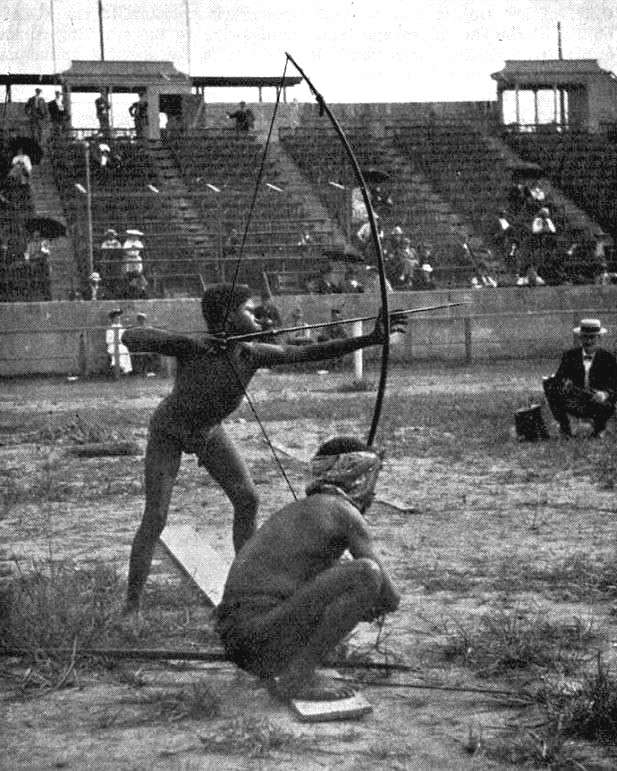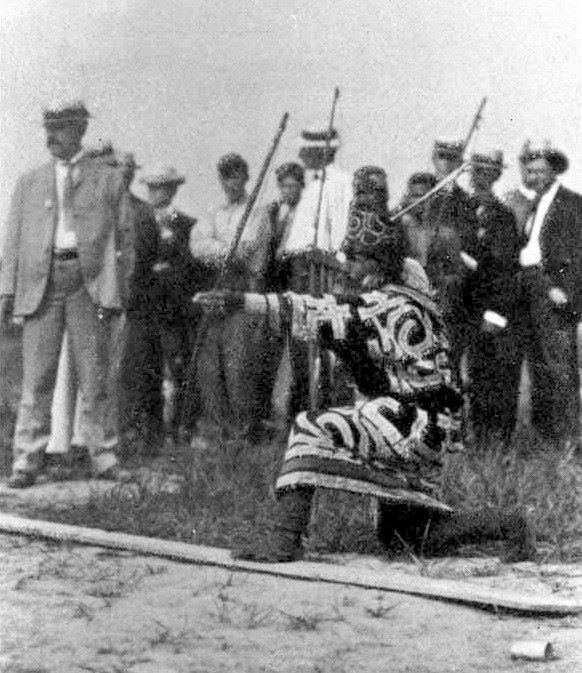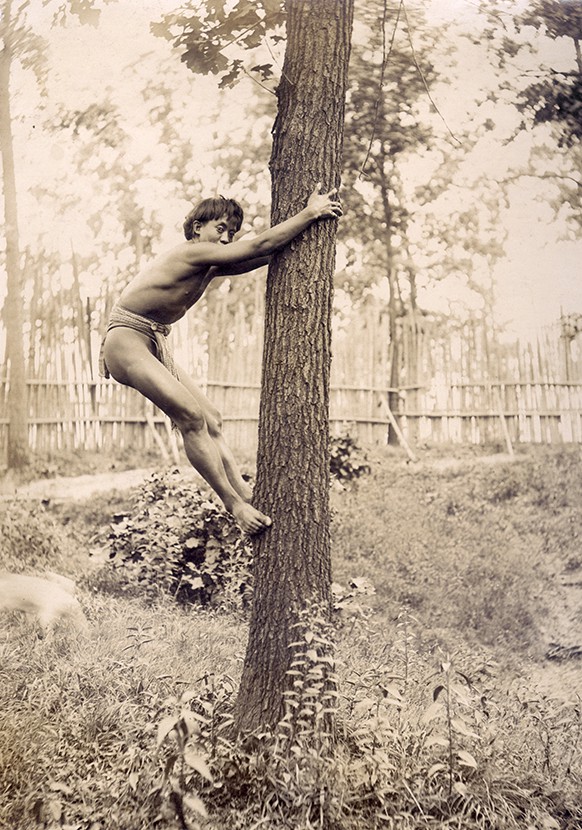Starting from the late 19th century through the early 20th, human exhibitions were a routine part of circuses, traveling shows, and major expositions in the west, where indigenous people from around the world and their cultures were exhibited as one displayed animals in a zoo. Exhibits for these human zoos were sourced from the tribes of Africa, Southeast Asia, the Middle East, the Pacific Islands, the Americas, and elsewhere. These men, women and children were often displayed living in mock ethnic villages, and presented with objectifying terms such as “primitives” and “pygmies”.

Such a depraved exhibition was held during the 1904 Olympics in St. Louis, Missouri, where natives from foreign lands participated in various “special Olympic” events. The event, called “Anthropology Days”, was a blatant attempt to demonstrate the inherent inferiority of the world’s indigenous peoples, and by making them compete in athletic events the goal was to establish the superiority of the whites.
The 1904 Olympics was originally slated for Chicago, but St. Louis, Missouri, wouldn’t have it, because the dates clashed with the St. Louis World's Fair, also known as the Purchase Centennial Exhibition. Concerned that the Olympics was going to draw visitors away from the exposition, the World’s Fair’s organizers demanded that the games be held in St. Louis instead, otherwise they threatened to hold a bigger and better sporting event that was sure to eclipse Chicago’s.
The Modern Olympic games was still a nascent movement, with the inaugural event organized only eight years previously. Fearing that rivalry would bring ruin to the Olympics and even threaten the continuity of the games, the International Olympic Committee founder Baron Pierre de Coubertin conceded and gave St. Louis the third Olympiad. And St. Louis messed it all up.

A native taking part at an archery event at the 1904 Olympic Games.
For starters, St. Louis was a second-tier city and difficult to reach, which kept almost all of the top European athletes away. Of the 651 athletes who competed, only 62 came from outside North America, representing only 12 nations, and many events had no non-American participants at all. Baron Pierre de Coubertin himself never came to see the games. The games were eventually overshadowed by the bigger event, the World’s Fair, with the prestigious sporting event reduced to a mere sideshow. Except “Anthropology Days”, which turned out to be a memorable event, albeit in a wrong way.
The rotten brains behind “Anthropology Days” was James Sullivan, chief organizer of the 1904 Summer Olympics. Sullivan firmly believed in white supremacy, and the Olympics gave him the opportunity to prove that. He persuaded anthropologist William John McGee, who was the head of the Department of Anthropology at the World’s Fair, to lend him a few men from the ethnic displays that he had set up at the fair, promising McGee that competition among the natives would generate a rich body of data that would help McGee make his mark in the field of anthropology.

Indian girls dressed for a ball game at the 1904 World’s Fair.
About a hundred indigenous men took part in various sporting events including baseball throwing, shot put, running, broad jumping, weight lifting, pole climbing, and tugs-of-war. Not surprisingly, the athletes, unprepared and ignorant of the rules, fared poorly.
“The concept of a sporting competition appeared lost on some potential competitors, however,” wrote Shoshi Parks for Timeline. “Even those who went on to the Anthropology Days seemed either to not fully understand the point of their participation or, if they did, to care little about the outcome.”
In the shot put event, six men took turns throwing a 56-pound weight, but when the second round came, they refused. Sprinters didn’t understand the idea of breaking through the finish line. Many stopped short of the ribbon and waited for others to arrive, before crawling together under the ribbon. At the tug-of-war, the Arapaho competitors arrived dressed in their best costumes, and when they learned the sport involved being dragged through the mud, they refused to take part. Even sporting events such as javelin throwing, which the organizers hoped the spear-wielding primitives would excel, proved to be a disappointment. Sullivan and McGee were surprised to see that most participants had trouble handling the javelin.

Ainu, an aboriginal from japan, taking part in archery at the 1904 Olympic Games.
To be fair, the natives who participated in Anthropology Days as well as the World’s Fair, were adequately compensated for their participation. Some of them had appeared in so some many different shows and exhibitions throughout Europe that they had their own agents and all.
In the end, Anthropology Days was a total failure. The games were poorly attended, and the body of data that William McGee was promised never materialized. Even the natives thought of the competitions as ridiculous.
Writing for Slate, Nate Dimeo said that for James E. Sullivan, at least, the games were a partial successful. “They demonstrated that these savages couldn’t even play a proper game of tennis, after all. Sullivan considered the natives’ failure to beat the Olympic record for the javelin a sure sign of racial inferiority rather than an aversion to an apparatus never before encountered.”
Baron Pierre de Coubertin, who completely avoided St. Louis saying he “had a sort of presentiment that the Olympiad would match the mediocrity of the town,” had a different sort of reaction. He was apprehensive.
He was reported to have said that the games “will lose its appeal when black men, red men and yellow men learn to run, jump and throw, and leave the white men behind.”

A native from Philippine climbs a tree at a mock ethnic village created for the St. Louis World’s Fair.
References:
# Nate Dimeo, Olympic-Sized Racism, https://slate.com/culture/2008/08/remembering-the-anthropology-days-at-the-1904-olympics.html
# Shoshi Parks, Scientists staged a racist Olympics in 1904 to “prove” white superiority, https://timeline.com/anthropology-days-scientists-racist-olympics-prove-white-superiority-7a45289071cf
# Dave Skretta, St. Louis Olympics was really World’s Fair with some sports, https://www.washingtonpost.com/sports/olympics/st-louis-olympics-was-really-worlds-fair-with-some-sports/2020/07/24/0664ea78-cdc3-11ea-99b0-8426e26d203b_story.html



Comments
Post a Comment